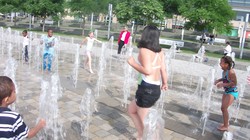It’s no secret that today’s news is often filled with reports of war, violence or the threat of both. These stories are so pervasive that even children can often readily describe it. But when asked to describe peace, the answer can be more challenging.
Judith Sheldon, peace activist, Presbyterian, and creator of downtown Detroit’s ‘Peace Camp’ is trying to remedy that.
“When you ask kids what peace is, so often they will say that it is being nice,” said Sheldon.
And while “being nice” is a part of peace, the answer encompasses so much more.
“It is very important that children understand that the fun play adventures — everything that we do that brings pleasure and joy and goodness — all of that is the result of peace,” Sheldon said.
Through Peace Camp, Sheldon hopes that this shift can be planted in the suburban and urban children of Detroit.
“We tell the kids — this feeling in your belly of being relaxed and laughing and smiling at someone, that feeling is a direct reflection of peace,” said Sheldon.
In 2001, Sheldon was asked by Fort Street Presbyterian Church — where she’s director of Christian Education — to lead a summer day camp program. She created a child-centered peace education program based in art, nature and citizenship.
“We wanted to create something where the kids would have an experience not of working at something, but of playing at it,” said Sheldon.
Peace Camp is intentionally local, rooted in the urbanism that is downtown Detroit. “It is designed so that we celebrate our local and regional self — our urbanism,” said Sheldon, who worries that cities are often portrayed as struggling places in need of help rather than celebrated for the many wonderful things they have to offer.
Peace Camp is funded primarily by grants, with support coming from the Presbytery of Detroit as well as the Synod of the Covenant. This means that kids are only charged a $25 registration fee for this two-week experience.
“A big part of the camp is that in order for it to work, we need to have everybody there — especially those kids whose parents might not be able to afford it,” said Sheldon.
In addition to the grants, Sheldon seeks ‘payment’ from the children’s families through adult participation and volunteering in some aspect of the Peace Camp experience. This gives the parents an excuse to be involved as well.
She also takes advantage of local services, such as a visit by the sanitation department in one of its newest and most high-tech garbage trucks. “The kids love the garbage truck, and the visit is free — paid with our tax dollars — for us in the city.”
Another favorite of the children is a local musical ensemble from the police department, called The Blue Pigs.
“They are in uniform, making some of the most amazing music on the planet — before it is over we are all up on the stage, waving our arms, and singing,” Sheldon said. “It is this wonderful eruption of complete goodness.”
Though it is a program run by and out of Fort Street Presbyterian Church, Peace Camp is intentionally both ecumenical and interfaith.
“Part of the peace experience is being with people who are different from you. I think that some of the most significant things that can happen are meeting people that have other traditions, dress differently or eat different foods,” Sheldon said. “If we limit ourselves to people who are pretty much like us, we are not going to learn how to handle and cherish and be interested in differences.”
Sheldon hopes that the seeds of peace sowed in the camp will stay with these children as they mature into adulthood.
“Children are capable of so much — if you trust that, you will be amazed and surprised and brought into many moments that are pure moments of the Spirit,” said Sheldon.
Erin Dunigan is a freelance writer, photographer, and pastor who lives in a small coastal community in Baja California, Mexico when she is not following her wanderlust out into the world.

